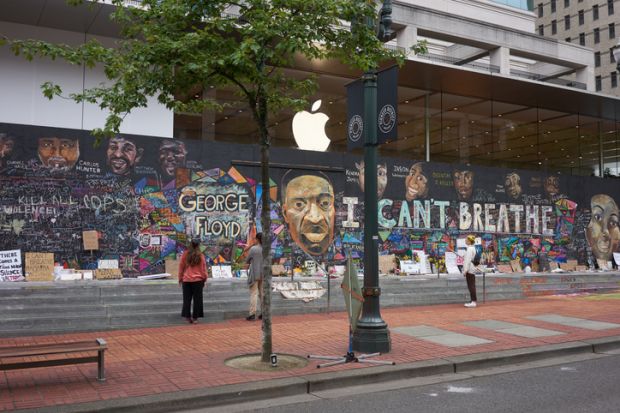Boston University is downsizing the Center for Antiracist Research that it created after the George Floyd killing in 2020.
Ibram Kendi, author of the 2019 book How To Be an Antiracist, was announced amid much fanfare – just days after Mr Floyd was murdered in Minneapolis – as a professor of humanities and founder and director of the new BU centre.
The appointment, said BU’s president at the time, Robert Brown, “will create a critical emphasis on research and policy to help eliminate racism in our country”. The project attracted large outside donations, including $10 million (£8 million) from Jack Dorsey, a co-founder and former chief executive of Twitter.
BU is now acknowledging, however, with virtually no details, that the centre is being significantly scaled back. A BU spokesman said he couldn’t confirm or deny reported cuts of about 15 to 20 of the centre’s 45 staff members, but did say the centre “is evolving to a fellowship model”.
Professor Kendi – recruited to BU from American University – was not available to discuss the matter, the spokesman said. “The centre plans to provide details on this new direction very soon,” the BU spokesman said. “The university and centre are committed to working with and supporting affected employees as they look for their next opportunities.”
BU’s confirmation of the problems prompted celebratory retorts from various conservative voices, who argued that BU’s creation of the centre was an act of political performance that had now backfired.
That perspective was largely endorsed by a former centre member, Saida Grundy, an associate professor of sociology and African American and black diaspora studies at BU. She joined the centre in early 2021 to serve as its assistant director of narrative, praising its mission to work with “marginalised communities about the issues they see as rooted in racism”.
She quit it less than a year later and has now begun offering harsh criticism of the centre.
She said the university created the centre in response to chronic complaints from students and alumni about its “abysmally low” levels of black students and black faculty.
“But BU is also an exceedingly status-hungry institution and increased black numbers threaten how it is perceived to elite white families,” she said. “So instead of a substantial institutional change…It was a Band-Aid on a bullet wound.”
BU’s black student enrolment has been around 4 per cent, and the black share of its faculty and staff is about 5 per cent, both well below the 14 per cent share in the nationwide population.
Register to continue
Why register?
- Registration is free and only takes a moment
- Once registered, you can read 3 articles a month
- Sign up for our newsletter
Subscribe
Or subscribe for unlimited access to:
- Unlimited access to news, views, insights & reviews
- Digital editions
- Digital access to THE’s university and college rankings analysis
Already registered or a current subscriber? Login








